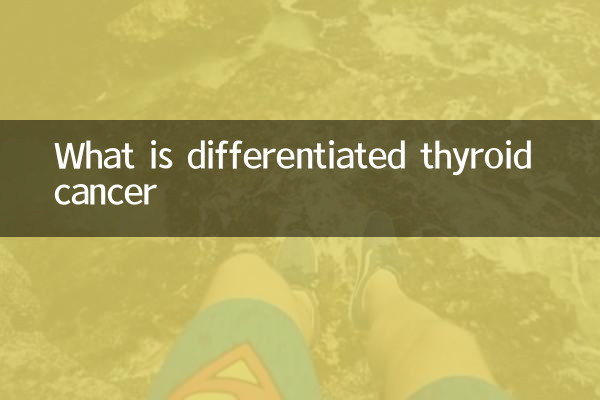What is differentiated thyroid cancer
Differentiated thyroid carcinoma is the most common type of thyroid cancer, accounting for approximately 90% of all thyroid cancer cases. It mainly includespapillary carcinomaandfollicular carcinomaTwo subtypes. This type of cancer usually grows slowly and has a better prognosis, especially if caught and treated early. The following is a detailed analysis of differentiated thyroid cancer.
1. Types of differentiated thyroid cancer

| type | Features | Proportion |
|---|---|---|
| papillary carcinoma | Slow growth, lymph node metastasis common | about 80% |
| follicular carcinoma | Easy to metastasize through blood, with slightly worse prognosis | About 10%-15% |
2. Symptoms of differentiated thyroid cancer
Differentiated thyroid cancer may have no obvious symptoms in the early stages, but as the disease progresses, the following symptoms may appear:
| symptom | describe |
|---|---|
| lump in neck | Most common symptoms, usually painless |
| hoarse voice | Tumor compression of recurrent laryngeal nerve |
| difficulty swallowing | The tumor grows and compresses the esophagus |
| swollen lymph nodes in neck | Tips for possible transfer |
3. Diagnosis of differentiated thyroid cancer
Diagnosing differentiated thyroid cancer usually requires the following tests:
| Check method | effect |
|---|---|
| Ultrasound examination | Initial assessment of the nature of thyroid nodules |
| fine needle aspiration biopsy | gold standard for diagnosis |
| Thyroid function test | Assess thyroid hormone levels |
| CT/MRI | Assess tumor extent and metastasis |
4. Treatment of differentiated thyroid cancer
Differentiated thyroid cancer is usually treated with the following methods:
| Treatment | Applicable situations |
|---|---|
| surgical resection | Main treatment options include total or partial resection |
| radioactive iodine therapy | Used to remove residual thyroid tissue or metastases |
| Thyroid hormone replacement therapy | Maintain normal thyroid function after surgery |
| targeted therapy | For late stage or relapsed patients |
5. Prognosis of differentiated thyroid cancer
The prognosis of differentiated thyroid cancer is generally good, with a 10-year survival rate of over 90%. Prognostic factors include:
| prognostic factors | Influence |
|---|---|
| age | Younger patients have better prognosis |
| tumor size | Less than 4cm has a better prognosis |
| Is there any transfer | Those without metastasis have a better prognosis |
| Pathological type | Papillary carcinoma has better prognosis than follicular carcinoma |
6. Prevention and precautions
Although the exact cause of differentiated thyroid cancer is not fully understood, the following measures may help reduce your risk:
1. Avoid unnecessary radiation exposure to the neck
2. Maintain a balanced iodine intake
3. Regular physical examination, especially thyroid examination
4. People with family history should be more vigilant
7. Recent hot topics
According to the hot content on the Internet in the past 10 days, discussions about thyroid cancer mainly focus on:
1. The trend of younger patients with thyroid cancer has attracted attention
2. Progress in the application of new targeted drugs in the treatment of thyroid cancer
3. The importance of postoperative management of thyroid cancer
4. Overdiagnosis and treatment controversy of thyroid microcarcinoma
Although differentiated thyroid cancer has a good prognosis, it still requires attention. Early detection, standardized treatment and regular follow-up are the keys to achieving the best outcome. If you have relevant symptoms, it is recommended to seek medical examination in time.

check the details

check the details